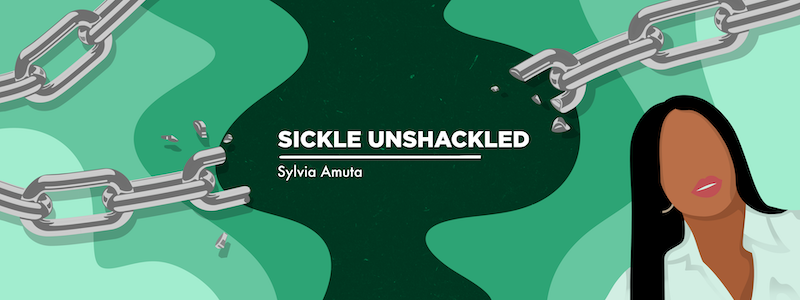The challenges of being a caregiver to my cousin with sickle cell
Like many caregivers, columnist Sylvia Amuta often struggles with burnout
Written by |

When I embarked on this journey as a caregiver for my cousin Ada, who has sickle cell disease, I soon realized that this path, brimming with love and dedication, also presented an unseen battle: caregiver burnout. Following are some of the frequent challenges I’ve faced — and triumphed over — as a caregiver to my cousin.
Since I started caregiving, sleepless nights have become my constant companion. There are days when all I want to do is sleep without any disturbances, but the unpredictable pain crises that torment my cousin make peaceful sleep a rare luxury. Each creak and whimper transforms into a symphony of worry echoing in my ears.
As time has passed, the lack of sleep has worn down my body and mind. However, I still have to summon the strength to comfort and support Ada, even when my own fatigue threatens to overwhelm me.
Balancing responsibilities
Like a skilled juggler, I find myself carefully balancing numerous responsibilities. I must coordinate Ada’s medical appointments, medications, and other treatments while simultaneously attending to daily chores, work demands, and personal obligations. Dividing my attention can be a tightrope act, leaving little room for self-care. Yet I press on, often sacrificing my own well-being to ensure my cousin receives the care she deserves.
Emotional roller coaster
Emotions run wild on this tumultuous journey. Witnessing my cousin’s pain, frustration, and limitations really tug on my heartstrings. There have been instances when I felt powerless to relieve her suffering, which overwhelmed me with guilt. I’ve grappled with my own emotions, striving to stay strong and positive while providing unwavering support through the darkest times. The roller coaster of emotions often leaves me drained and vulnerable, yet I continue moving forward.
Isolation and sacrifice
In the shadows of caregiving, I have faced the challenges of isolation and sacrifice. Social outings and personal hobbies are distant memories now that my world revolves around my cousin’s needs. While I cherish the time I spend with Ada, the loss of personal space and time for self-care have taken a toll. At times, it can be disheartening to prioritize others’ needs over my own desires, but I find solace in knowing that my sacrifices hold meaning and purpose.
Advocacy and frustration
Navigating the complexities of healthcare can be a difficult task. Engaging in battles with insurance companies, seeking out the right specialists, and ensuring quality care are an uphill climb. Financial burdens and the constant communication with healthcare professionals add layers of frustration to my already exhausted state. Nevertheless, driven by determination, I continue to fight for my cousin’s rights, advocating fiercely for her well-being.
As I reflect on my journey caring for my cousin, I realize that caregiver exhaustion has had a profound impact on me, and I’m probably not alone in facing this challenge. However, within this unseen struggle, moments of triumph, resilience, and unwavering love have emerged.
Despite the sleepless nights, countless responsibilities, emotions, isolation, and frustration, I find comfort in the knowledge that my presence and support have made a tangible difference in Ada’s life. This experience has taught me the profound depths of unconditional love, sacrifice, and the indomitable resilience of the human spirit.
Note: Sickle Cell Disease News is strictly a news and information website about the disease. It does not provide medical advice, diagnosis, or treatment. This content is not intended to be a substitute for professional medical advice, diagnosis, or treatment. Always seek the advice of your physician or other qualified health provider with any questions you may have regarding a medical condition. Never disregard professional medical advice or delay in seeking it because of something you have read on this website. The opinions expressed in this column are not those of Sickle Cell Disease News or its parent company, Bionews, and are intended to spark discussion about issues pertaining to sickle cell disease.







Akinwale M O
The write-up by Dr Sylvia Amuta succinctly summarised the sufferings that individuals with life-limiting illnesses and their caregivers go through. The sufferings or pains are not only physical but psychological/emotional, social/financial and spiritual. I really commend Dr Sylvia for the total care of her cousin.
In this write-up, the doctor did not state the involvement of Palliative care (PC) services in the care of her patient. Palliative care offers a multi-disciplinary approach to the care of individuals with chronic, life-limiting illnesses (both cancer and non-cancer). The main aim is to improve the quality of life of these patients, their families and caregivers and this is done holistically including all domains of suffering. I'm a Consultant Anaesthetist, Pain and Palliative care Physician.
Involving PC services in the care will relieve Dr Sylvia of the burnt-out and personal sufferings she has gone through. I know that PC services are still in their infancy in Nigeria but some Teaching hospitals are offering this care. These include UCH, Ibadan (where I presently work), UITH, Ilorin, FMC, Abeokuta, UNTH, Enugu, UPTH, Port Harcourt, ABU, Zaria and very recently, LUTH, Idi Araba, Lagos is starting her PC programme. Kind regards.